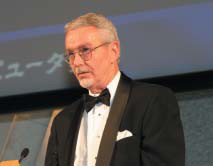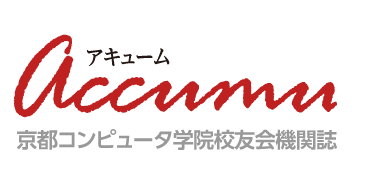Accumu Vol.13
学問の未来と国の未来を担うコンピュータ
コロンビア大学 インターナショナル・パブリックアフェアズ校 ティーチャーズカレッジ教授
インタラクティブ社 代表取締役
デール・マン博士 Dr. Dale Mann
1 未来を創り出す不可避な三つの力

長い間に確立され,多くの源に端を発している「潮流」に由来したものである場合にのみ,未来というものを予想することができます。現在,世の中で機能しているこのような「潮流」には次の三つがあり,その三つとも日本に,そして京都コンピュータ学院に存在するものです。すなわち,(1)民主主義,(2)自由市場経済,(3)テクノロジーの三つです。 20世紀の歴史は,この「潮流」を逆転させることができないことを我々に教えています。この三つは常に成長し続けていくものなのです。我々の任務は最大の恩恵を得ることができるようにその舵を取ることなのです。
2 テクノロジーと経済の変動:アメリカの例
1990年代のアメリカを考えてみてください。錆つき疲れきった経済が低品質の少量の製品を高い値段で作り出していました。他の国々が,アメリカが発明した連続生産プロセス全体を支配するようになりました。自動車しかり,鉄鋼しかり,電子組み立て部品しかり。すべて他の国々に主導権を握られていたのです。
ところが1990年代は,アメリカが,経済的ばかりでなく政治的にも世界唯一の強力な国となって幕を閉じました。アメリカの国内総生産の成長の40%はテクノロジーによって可能になった生産性の上昇によるものです。
「非農業部門の生産性の年間成長率はこの四半期(2001年第2四半期)には2.5%と健全な成長を示し,ビジネスも少ない労働力でほぼ同じ生産高を上げている。この今までにない快挙は,テクノロジーの助けを借りて経済が20年間の不景気から脱出したことを示している。」また,「生産性の向上が,コンピュータとインターネットによってより効率的になった国を反映するとするなら,平均経済成長率は約3.5%となるであろう。」 [David Leonhardt,『不景気にもかかわらず生産性はなおも向上し続ける』,New York Times,2001年8月8日号,p.C1]
国はどのように自国の将来の舵を取るのでしょうか? テクノロジーが先進国の経済の様々な領域に与える長期的な影響について考えてみましょう。
●輸送:20世紀初めには,輸送といえば列車,馬,そして「自動車」を意味していました。現在では,1996年以降に作られた車は,初めて月面に着陸した宇宙船,アポロ11号よりもさらにコンピュータ制御の進んだエンジンを備えています。
●財政:個人の銀行取引の80%はコンピュータで行われています。我々は窓口に並んで待って銀行の窓口係と個人的に接触するよりもむしろ,ATMを使用することが多くなっています。そしてこのATM技術はユーザーから見えない「トランスペアレント」なものであり,訓練を必要としません。
●コミュニケーション:ロシアに初めて電信機がもたらされた頃,レオ・トルストイが母親を乗せて田舎道を走っていた時,母親が「あの柱とワイヤは一体何のためなの」と尋ねました。トルストイは「言葉を運ぶためのものです」と答えました。しばらく眺めてから母親は,「でも何も見えないわ」と言いました。これはたった100年前の話です。2004年には 4300万人の若者が無線でコミュニケーションしているでしょう。 [Stephanie Miles, “Wireless Entertainment Attracts Investors”, Wall Street Journal, 2001年3月6日]
●農業:農夫は,かつては経済の最も遅れた領域にいるものであるとされていました。しかし,もはやそうではありません。今やトラクターは,全地球測位衛星と交信し,オンボードコンピュータで解析された土壌組成と水分に基づいてどこにどれだけの量の種をまき,施肥するのか1メートルごとに調整する中継機とともに売られているのです。
●ビジネス:最初は電子技術が,現在ではデジタルテクノロジーが仕事の形を変えました。「タイプ課」を憶えているでしょうか? 現在ではかつてのタイピストに代わって,誰もが自分で「ワープロ」を使っています。賢明な組織は,専門的技術はすぐに仕事の時間と個人の時間,家庭と会社の間の境界を曖昧にするであろうと確信し,雇用者にラップトップと携帯電話を買い与えています。
3 京都コンピュータ学院と将来
私は,人々がどのように学習するのか理解することを生涯の仕事としてきました。我々は皆,アメリカ人小説家,マーク・トウェインの教え,「“学校に行くこと”と“学問をすること”を混同してはならない」ということを忘れています。
また,哲学者(コロンビア大学の一員でもある)ジョン・デューイの言葉,「我々は直接的な指示によっては何物も実際に教えることはできない。むしろ周囲の環境を整えることによって教えることができる」を忘れています。デューイが1932年にこう語った時,彼には学生を外部に実習に行かせる以外には「環境を整える方法」はありませんでした。
デジタル技術,コンピュータを用いると,教えることのできるミクロの世界を作り出すことができます。デジタルテクノロジーは診断や記憶機構,プレゼンテーションを変化させます。京都コンピュータ学院はこの新しい可能性を示す世界の主導的な立場にあります。また,日本はICT支出額でも世界有数の国です。左の表は,変化の見られないアメリカに比べ,日本のICT投資額がダイナミックに変化していることを示しています。
私は若い頃,ワシントンDCで政府のために働いたことがあります。というのは,アメリカ合衆国大統領,ジョン・ケネディが「我々はどのように国を動かせばよいのだろうか」と問うたからです。また,「我々はどのように市民一人ひとりを前進させればよいだろうか」と問うたもう一人の大統領,リンドン・ジョンソンの下で働くという名誉にも浴しました。
私は当時の政府による国の進歩を誇りに思っていますが,ひとつ残念に思っていることがあります。それは,京都コンピュータ学院を通じて日本が得ているような資源をアメリカが得ようと考えなかったことです。私は,京都コンピュータ学院が日本で初めてかつ唯一のIT専門職大学院を設立することにおいて,日本の文部科学省の賢明さを祝したいと思います。京都コンピュータ学院の創る「京都情報大学院大学」は,他の人々がよりどころとする堅固な岩となるでしょう。そして,長谷川亘氏は,彫刻家のように,その岩の中に将来形作られるものを見ている石工と言ってよいでしょう。
将来,世界の主導者として成功するかどうかは,テクニカルシステム,コンピュータシステムを学習目的に利用する能力があるかどうかに依存しています。すなわち,これこそが京都コンピュータ学院の使命でもあります。周知のように,学校というものはその指導力と学部の持つ力以上の強さを発揮することはできません。京都コンピュータ学院のCEO,統括理事である長谷川亘氏は,コロンビア大学の博士課程の優秀な学生でもあります。時にはどちらが教授でどちらが学生かわからなくなるほどの卓越した学生です。
今ここで述べた三つの「潮流」がひとつになって明るい未来を作り出そうとすることはそうしばしばあるものではありません。しかし,京都コンピュータ学院は,世界の将来を定義する力,すなわち,民主主義と自由市場経済とテクノロジーを象徴しています。そうであるがゆえに,京都コンピュータ学院が成し遂げたこと,将来成し遂げようとしていることによって日本と世界はよりよい場所になるだろうと想像するに難くありません。
私は,京都コンピュータ学院の偉業を祝する一翼を微力ながら担えたことを非常に名誉に思っております。この機会を与えてくださったことに,またご清聴に感謝いたします。
ハッピーバースデーKCG!
| 日本・アメリカICT投資額の比較 | ||||
| (影響領域) | 日本 | アメリカ合衆国 | ||
| (年) | 1995 | 2000 | 1995 | 2000 |
| GDPに占めるICTの割合(%) | 5.3 | 9.6 | 7.5 | 7.9 |
| 国民一人当たりのICT($) | $2228 | $3256 | $2119 | $2924 |
| ビジネスに与えるインターネットの影響(トップ7) | 4.1 | 5.0 | ||
| 高度な技術力を有するIT求人市場(トップ7) | 5.9 | 6.7 | ||
Computers, the Future of Learning and the Future of Countries
Dale Mann, Ph.D., Professor,
School of International and Public Affairs and Teachers College
Columbia University in the City of New York (and)
Managing Director, Interactive, Inc.
1.0 Three Irrevocable Forces That Create the Future
The future can only be predicted if it comes from trends that are long-established and from many sources. There are three such trends operating in the world: they are all present in Japan and in the Kyoto Computer Gakuin. They are (1) democracy, (2) free market economics and (3) technology. The history of the 20th century teaches that those trends cannot be reversed: they will only grow. Our job to steer them for maximum benefit.
2.0 Technology and Economic Transformation: American Examples
Think of America in the 1990s---a rusty, tired economy producing too few, low-quality products for high prices. Other countries have come to dominate all of the continuous production processes that America had invented. Automobiles, steel, electronic assembly - all were captured by other countries.
But the 1990s ended with America as the world's only super-power, economically as well as politically. Forty percent of the growth in the American gross domestic product has been attributed to productivity gains enabled by technology.
"Non-farm productivity rose at a healthy 2.5 percent annual rate in the quarter (Q2, 01), as businesses produced roughly the same output using less labor. … The unusual feat offers further evidence that, with the help of technology, the economy has emerged from a 20-year productivity slump …" And, "If productivity gains … reflect a country made more efficient by computers and the Internet, the long-term average growth of the economy may be about 3.5 percent." [David Leonhardt, "Productivity Still Gaining Despite Slump," New York Times, Aug. 8, 2001, p. C1]
How does a country steer its future? Think about the long-term effect of technology on different sectors of any developed economy.
- Transportation. At the beginning of the 20th Century, transportation meant trains, horses, and "motorcars." Now every car built since 1996 has more computing firepower than did the first lunar lander--- the Apollo 11.
- Finance. Eighty percent of personal banking transactions are done by computer. Rather than wait in line for personal contact with a teller, we all use ATMs. And ATM technology is "transparent", it does not require training.
- Communications. When the telegraph first came to Russia, Leo Tolstoy was driving his mother down a country road. She asked what the poles and wires were for, and he replied, "They are used to move words." After watching for a while, she announced that she had not seen any. That was only a hundred years ago. In 2004, 43 million young adults will be using wireless communication. [Stephanie Miles, "Wireless Entertainment Attracts Investors," Wall Street Journal, March 6, 2001]
- Agriculture. Farmers were once famous as the most backward sector of the economy. No more. Tractors are sold with transponders that talk to global positioning satellites and adjust the amount of seed and fertilizer every meter depending on an on-board computer analysis of the soil composition and moisture.
- Business. First electronic technology and now digital technology have transformed work. Remember "typing pools"? Now we all "word-process" what was once typed by someone else. The smart organization buys its employees laptops and cell phones, confident that professionalism will promptly blur the lines between company time and personal time, home and work.
3.0 The Kyoto Computer Gakuin and the Future
I have spent my career trying to understand how people learn. All of us forget what the American novelist, Mark Twain, taught: "Never confuse schooling and learning."
And we forget what the philosopher (also from Columbia University) John Dewey said:"We practically never teach anything by direct instruction, but rather by the creation of settings." When Dewey said that in 1932 he did not have any way to "create settings" except by sending students out to apprentice at the workplace.
With digital techniques, with computers, we can create micro-worlds that teach. Digital technology changes diagnosis, storage, and presentation and the Kyoto Computer Gakuin is leading the world in demonstrating the new possibilities.
And, Japan is leading the world in ICT expenditures. The following shows Japan's dynamic investment in ICT compared to the United States' investment that has not changed.
As a young man, I went to Washington, DC to work in the national government because one president, John Kennedy, asked "How do we move the nation?" I had the privilege of working for another president, Lyndon Johnson who asked, "How do we advance every citizen?"
As proud as I am of the domestic gains of that government, I regret that America did not then think to equip my country with the resources that Japan has through the Kyoto Computer Gakuin. I congratulate Monbusho for its wisdom in establishing the Kyoto College of Graduate Studies for Informatics, Japan's first and only professional school in Information Technology. The Kyoto College of Graduate Studies for Informatics is the rock on which others will build and Wataru Hasegawa is the stone-mason who, like a sculptor, saw the shape of the future inside the rock.
In the world of the future, successful leadership will depend on the ability to harness technical systems, computer systems to learning purposes- --that is the mission of the Gakuin. As we all know, a school is only as strong as its leadership and its faculty. The CEO of Kyoto Computer Gakuin, Mr. Wataru Hasegawa is an outstanding doctoral student at Columbia University---so outstanding that it is often difficult to tell who is the professor and who is the student.
It does not happen often that three trends come together to produce a bright future. But the Kyoto Computer Gakuin represents the forces that are defining the world's future---democracy, market economics and technology. Because of that, it is easy for me to predict that Japan and the world will be a better place because of what you have accomplished and because of what you will do in the future.
I am honored to have a small part in celebrating the accomplishments of Kyoto Computer Gakuin. Thank you for this opportunity and for listening to these remarks.
| Japan-US Comparative Investment in ICT | ||||
| (area of impact) | Japan | United States | ||
| (year) | 1995 | 2000 | 1995 | 2000 |
| ICT as %of GDP | 5.3 | 9.6 | 7.5 | 7.9 |
| ICT per capita ($) | $2228 | $3256 | $2119 | $2924 |
| Internet effect on business (7 tops) | 4.1 | 5.0 | ||
| Highly-skilled IT job market (7 tops) | 5.9 | 6.7 | ||



